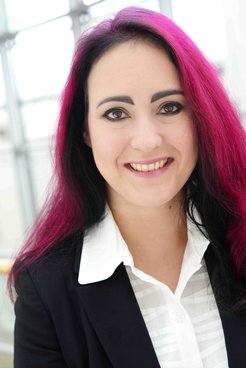Prof. Michèle Heurs receives Leibniz Universität award for excellent teaching in 2017
AEI researcher wins prize in the group of professors
Prof. Michèle Heurs, professor at the Institute for Gravitational Physics at Leibniz Universität Hannover and at the Max Planck Institute for Gravitational Physics (Albert Einstein Institute; AEI), will be awarded the Leibniz Universität Hannover prize for excellent teaching in the group of all professors. The award is endowed with 5000 Euros and was presented on the 12th of January 2018 during the President’s and Deans’ New Year reception in the atrium of the main university building.

Michèle Heurs has been giving lectures about basic concepts of physics and advanced topics since 2011. She also developed the entirely new lecture “electronic metrology in the optics laboratory” in 2013. In 2017 she gave the lectures “non-classical light” and “non-classical laser interferometry”, which taught students important basics of modern laser interferometry used in gravitational-wave astronomy.
“I very much enjoy teaching current topics of physics to young people, which are entirely new to them. I regard it as one of my most important tasks,” says Michèle Heurs. “I am delighted that my excitement about teaching and my efforts have been honored by the Leibniz Universität.”
Evaluations of Michèle Heurs' lectures by the students show her high level of commitment in teaching and her didactic skills.
Prof. Heurs also was awarded the 2017 prize for excellent teaching by the department of mathematics and physics. Furthermore, she does outreach for the institute through inspirational popular science talks and experiments for interested lay people.
Michèle Heurs (born 1975) studied physics in Hannover and did her PhD about new stabilization schemes for laser systems in gravitational-wave detectors in 2004 at the Institute for Gravitational Physics and the Max Planck Institute for Gravitational Physics (Albert Einstein Institute). She worked as a researcher at this institute and was a Research Fellow at the University of New South Wales in Canberra, Australia. In 2010 she became a position as junior professor in the QUEST (Centre for Quantum Engineering and Space-Time Research) cluster of excellence at Leibniz Universität Hannover. In late 2016 she was appointed as professor of physics in the Institute for Gravitational Physics at Leibniz Universität Hannover.












